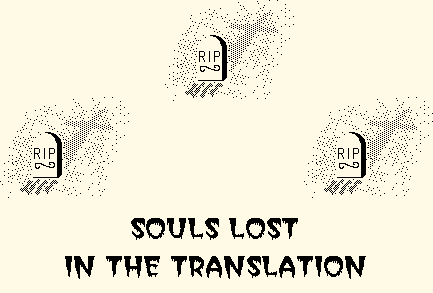Addendum
Here are some additional examples of language translation problems,
sent to me by an associate on June 25, 2004.
The American Dairy Association was so successful with its "Got Milk?"
campaign, that it was decided to extend the ads to Mexico. Unfortunately,
the Spanish translation was "Are you lactating?"
Electrolux, a Scandinavian vacuum manufacturer, used this ad in the
U.S.: "Nothing sucks like an Electrolux."
Colgate introduced a toothpaste called "Cue" in France, but it turned
out to be the same name as a well-known porno magazine.
When Braniff translated a slogan touting its upholstery, "Fly in leather,"
it came out in Spanish as "Fly naked."
Coors put its slogan, "Turn it loose," into Spanish, where it was read
as "Suffer from diarrhea."
Chicken magnate Frank Perdue's line, "It takes a tough man to make a
tender chicken," sounds much more interesting in Spanish: "It takes
a sexually stimulated man to make a chicken affectionate."
Bacardi concocted a fruity drink with the name "Pavian" to suggest French
chic ... but "pavian" means "baboon" in German.
A hair products company, Clairol, introduced the "Mist Stick", a curling
iron, into Germany only to find out that mist is slang for manure.
When Kentucky Fried Chicken entered the Chinese market, to their horror
they discovered that their slogan "finger lickin' good" came out as "eat
your fingers off."
Parker Pens translated the slogan for its ink, "Avoid Embarrassment
— Use Quink" into Spanish as "Evite Embarazos — Use Quink" ... which also
means, "Avoid Pregnancy — Use Quink."
When Pepsi started marketing its products in China a few years back,
they translated their slogan, "Pepsi Brings You Back to Life" pretty literally.
The slogan in Chinese really meant, "Pepsi Brings Your Ancestors Back from
the Grave."
In Italy, a campaign for "Schweppes Tonic Water" translated the name
into the much less thirst quenching "Schweppes Toilet Water."
Chinese translation proved difficult for Coke, which took two tries
to get it right. They first tried Ke-kou-ke-la because when pronounced
it sounded roughly like Coca-Cola. It wasn't until after thousands
of signs had been printed that they discovered that the phrase means "bite
the wax tadpole" or "female horse stuffed with wax," depending on the dialect.
Second time around things worked out much better. After researching
40,000 Chinese characters, Coke came up with "ko-kou-ko-le" which translates
roughly to the much more appropriate "happiness in the mouth."
 |
Page 23 |
|
![]()

![]()










